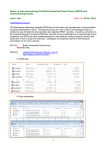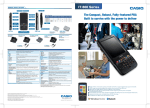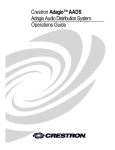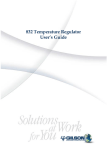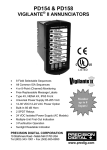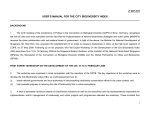Download Acer AcerSystem User guide
Transcript
Aspire One Series Quick Guide © 2010 All Rights Reserved. Aspire One Series Quick Guide Original Issue: 11/2010 Aspire One Series Notebook PC Model number: __________________________________ Serial number: ___________________________________ Date of purchase: ________________________________ Place of purchase: ________________________________ 3 First things first We would like to thank you for making an Acer notebook your choice for meeting your mobile computing needs. Your guides To help you use your Acer notebook, we have designed a set of guides: First off, the setup poster helps you get started with setting up your computer. The Aspire One Series Generic User Guide contains useful information applying to all models in the Aspire One product range. It covers basic topics such as Acer's eRecovery Management, using the keyboard, audio, etc. Please understand that due to its nature, the Generic User Guide as well as the AcerSystem User Guide will occasionally refer to functions or features which are only contained in certain models, but not necessarily in the model you have purchased. Such instances are marked in the text with language such as "only for certain models". The Quick Guide introduces you to the basic features and functions of your new computer. For more on how your computer can help you to be more productive, please refer to the AcerSystem User Guide, which contains detailed information on such subjects as system utilities, data recovery, expansion options and troubleshooting. In addition it contains warranty information and the general regulations and safety notices for your notebook. It is available in Portable Document Format (PDF) and comes preloaded on your notebook. Follow these steps to access it: 1 Click on Start > All Programs > AcerSystem. 2 Click on AcerSystem User Guide. Note: Viewing the file requires Adobe Reader. If Adobe Reader is not installed on your computer, clicking on AcerSystem User Guide will run the Adobe Reader setup program first. Follow the instructions on the screen to complete the installation. For instructions on how to use Adobe Reader, access the Help and Support menu. English 4 Your Acer notebook tour After setting up your computer as illustrated in the setup poster, let us show you around your new Acer notebook. Top view 1 9 2 3 4 5 8 6 7 # Icon Item Description 1 Microphone Internal microphone for sound recording. 2 Display screen Also called Liquid-Crystal Display (LCD), displays computer output (configuration may vary by model). 3 Power button Turns the computer on and off. 5 Icon Item Description 4 Keyboard For entering data into your computer. 5 Touchpad Touch-sensitive pointing device which functions like a computer mouse. 6 Status indicators1 Light-Emitting Diodes (LED) that light up to show the status of the computer's functions and components. 7 Click buttons (left and right) The left and right buttons function like the left and right mouse buttons. 8 Palmrest Comfortable support area for your hands when you use the computer. 9 Acer Crystal Eye webcam Web camera for video communication (configuration may vary by model). 1. The front panel indicators are visible even when the computer cover is closed. Hotkeys The computer employs hotkeys or key combinations to access most of the computer's controls like screen brightness and volume output. To activate hotkeys, press and hold the <Fn> key before pressing the other key in the hotkey combination. Hotkey Icon Function Description <Fn> + <F3> Communication Enables/disables the computer’s key communication devices. (Communication devices may vary by configuration.) <Fn> + <F4> Sleep Puts the computer in Sleep mode. <Fn> + <F5> Display toggle Switches display output between the display screen, external monitor (if connected) and both. <Fn> + <F6> Screen blank Turns the display screen backlight off to save power. Press any key to return. <Fn> + <F7> Touchpad toggle Turns the internal touchpad on and off. <Fn> + <F8> Speaker toggle Turns the speakers on and off. English # English 6 Hotkey Function Description <Fn> + <F11> Icon Num Lock When Num Lock is on, the embedded keypad is in numeric mode. The keys function as a calculator (complete with the arithmetic operators +, -, *, and /). Use this mode when you need to do a lot of numeric data entry. A better solution would be to connect an external keypad. <Fn> + <F11> only for certain models. <Fn> + <F12> Scroll Lock When Scroll Lock is on, the screen moves one line up or down when you press the up or down arrow keys respectively. Scroll Lock does not work with some applications. <Fn> + < > Brightness up Increases the screen brightness. <Fn> + < > Brightness down Decreases the screen brightness. <Fn> + < > Volume up Increases the sound volume (only for certain models). <Fn> + < > Volume down Decreases the sound volume (only for certain models). Using the communication key* Here you can enable and disable the various wireless connectivity devices on your computer. Press <Fn> + <F3> to bring up the Launch Manager window panel. A red toggle indicates the device is off. Click On to enable wireless/Bluetooth connection. Click Off to disable connection. * Communication devices may vary by model. 7 English Closed front view 1 # Icon 1 Item Description Power indicator Indicates the computer's power status. Battery indicator Indicates the computer's battery status. 1. Charging: The light shows amber when the battery is charging. 2. Fully charged: The light shows blue when in AC mode. HDD indicator Indicates when the hard disk drive is active. Communication indicator Indicates the status of 3G/Wireless LAN communication Blue light on Orange light on Not lit 3G on / Wi-Fi on 3G off / Wi-Fi on 3G off / Wi-Fi off 3G on / Wi-Fi off Rear view 1 # Item Description 1 Battery bay Houses the computer’s battery pack. Note: Your computer may be equipped with a different battery to the one in the picture. English 8 Left view 1 # Icon 2 3 Item Description 1 DC-in jack Connects to an AC adapter. 2 External display (VGA) port Connects to a display device (e.g., external monitor, LCD projector). 3 USB ports Connect to USB devices (e.g., USB mouse, USB camera). Right view 1 # Icon 2 3 4 5 Item Description 1 2-in-1 card reader Accepts Secure Digital (SD) and MultiMediaCard (MMC). Note: Push to remove/install the card. Only one card can operate at any given time. 2 Headphone/speaker/ line-out jack Connects to audio line-out devices (e.g., speakers, headphones). Microphone-in jack Accepts inputs from external microphones. 3 USB port Connects to USB devices (e.g., USB mouse, USB camera). 4 Kensington lock slot Connects to a Kensington-compatible computer security lock. 5 Ethernet (RJ-45) port Connects to an Ethernet 10/100 based network. 9 6 1 2 5 4 3 # Icon Item Description 1 Ventilation slots and cooling fan Enable the computer to stay cool, even after prolonged use. Note: Do not cover or obstruct the opening of the fan. 2 Battery release latch Releases the battery for removal. 3 3G SIM card slot Accepts a 3G SIM card for 3G connectivity (only for certain models). 4 Battery bay Houses the computer's battery pack. 5 Battery lock Locks the battery in position. 6 Speaker Emits audio from your computer. Environment • Temperature: • • • Operating: 5 °C to 35 °C Non-operating: -20 °C to 65 °C Humidity (non-condensing): • • Operating: 20% to 80% Non-operating: 20% to 80% English Base view










